
Unveiling India's $24 Billion Agri-Tech Empire: 3 key insights you can't miss
Wed Jul 19 2023
5 min read
The Economic Survey of India 2022-23 highlighted that India’s agriculture sector had grown by 4.6% over the last six years, with over 1000 agri-tech start-ups emerging. As per an EY report, agri-tech startups in India have the potential to reach a market worth $24 billion by 2025. Meanwhile, the Avendus report forecasts a market worth $34 billion by 2027.
But what exactly does agricultural technology (agri-tech) involve?
Agri-tech refers to using digitalisation and modern techniques to improve existing agricultural practices.
Agri-tech companies innovate and solve roadblocks for
- Farm mechanisation,
- Farm inputs,
- Controlled environment agriculture,
- Farm analytics and agronomy advisory,
- Contract farming,
- Precision agriculture,
- Market linkage and supply chain solutions,
- Fintech facilities for credit and insurance (including Debt vs Equity),
- Quality management and traceability.
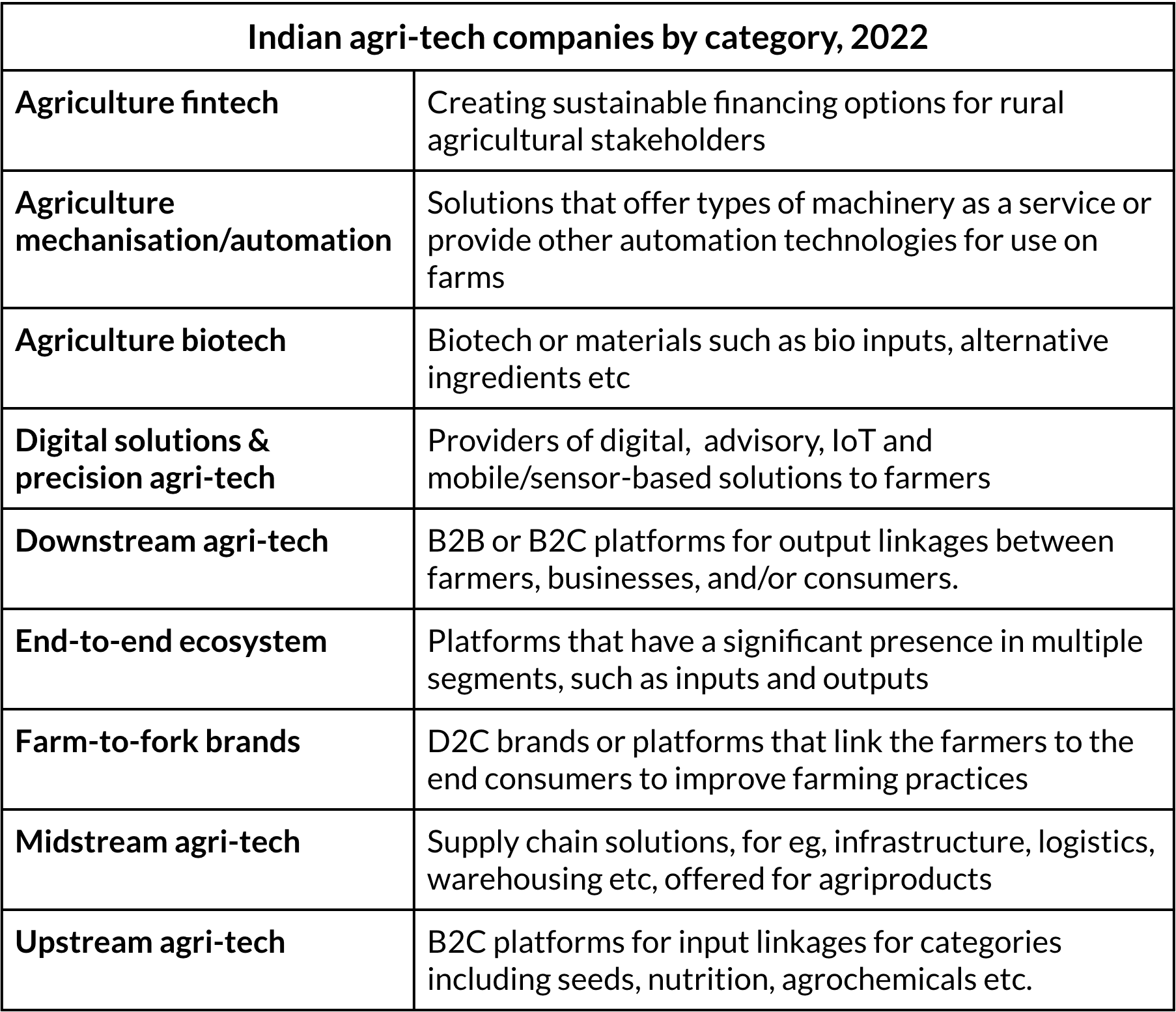
We delved deeper into India's agri-tech universe to uncover these 3 valuable insights that will help you gain a better understanding.
Significance and growth potential of the agri-tech industry in India’s Economy
India's vast and dynamic geographical area makes its agricultural sector diverse. From cereals and pulses to spices, fruits, and vegetables, the country is one of the most productive agrarian economies in the world.
This agri-sector contributes approximately 19% to GDP and employs almost 45% of the national workforce as of 2021-22.
By 2030, agriculture could contribute around $600 billion to India’s GDP—an increase of 50% over its contribution in 2020. Not to mention that India is among the 15 leading agricultural exporters globally.
Despite such a flourishing agricultural sector, Indian farmers lag behind their counterparts in the developed world. They lack basic farming equipment, 3/4th of Indian farms are at risk of crop damage from pests and weather, and 50% of India’s farmers lack access to financing sources.
Those who can get credit often pay inflated interest of 10 to 25% above market rates.
Key Insight 1 - Unlocking the untapped growth potential
Indian agri-tech start-ups have a significant potential to unlock growth and productivity for the agri-sector.
It can sweep in with its latest advancements to make the agri-sector technologically more competitive by presenting original and feasible solutions, increasing its contribution to India’s GDP and easing farmers' lives. Using state-of-the-art technology can help farmers yield better produce while raising their incomes.
An EY report estimates India's agri-tech industry is significantly untapped, with only 1.5% penetration. It is expected to lead the next decade’s technology-first value creation opportunity, positively impact over 40 million farmers across India, and propel Indian farmers’ incomes to grow by 25-35%.
Investments in agri-tech start-ups
As per Statista, venture capital (VC) investment in India's agri-tech sector was 1.2 billion U.S. dollars in 2022. However, agriculture and food-tech startups have raised a total funding of $2.4 billion in 2022 from all sources, including Debt vs Equity.
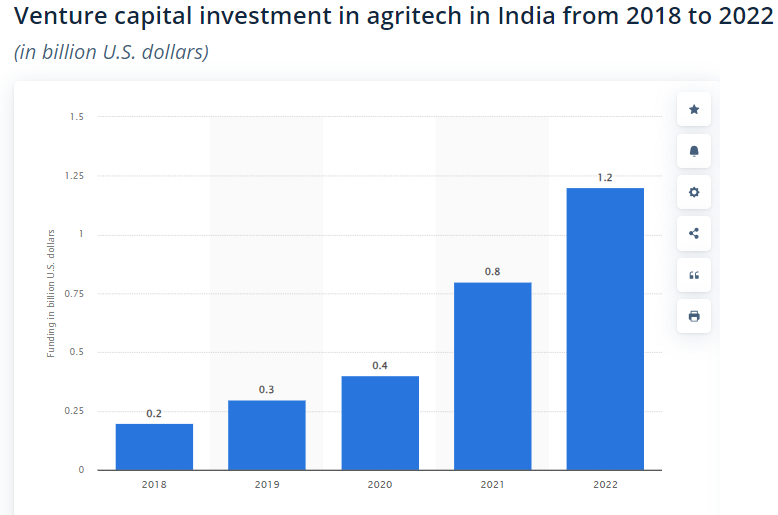
Key Insight 2 - An uptick in agri-tech by private investors
As the world population grows rapidly, there is increasing pressure on food systems worldwide.
This has increased demand for technological advancements and agricultural interventions, becoming a promising playground for public and private investments.
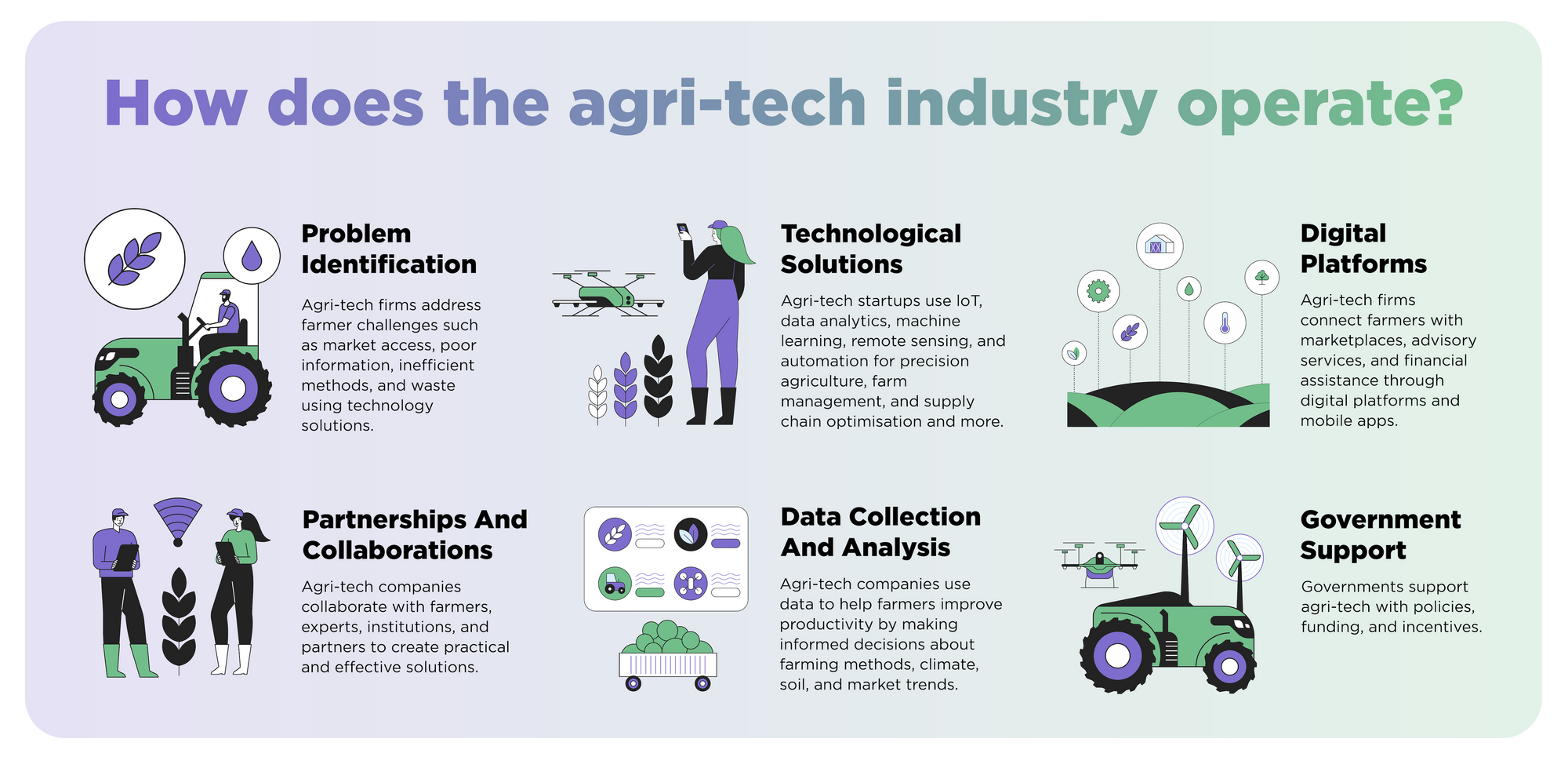
Notable agri-tech startups in India
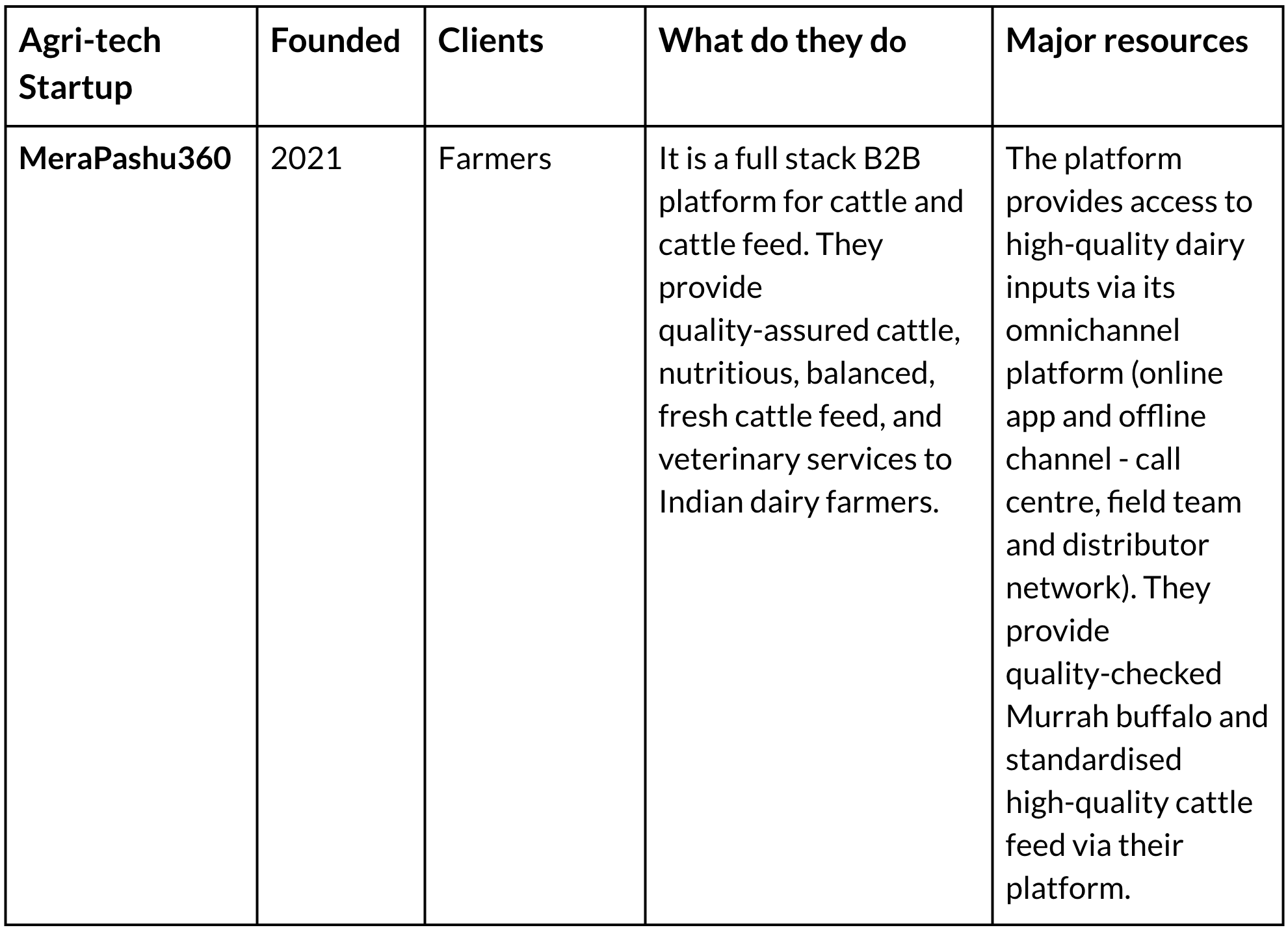
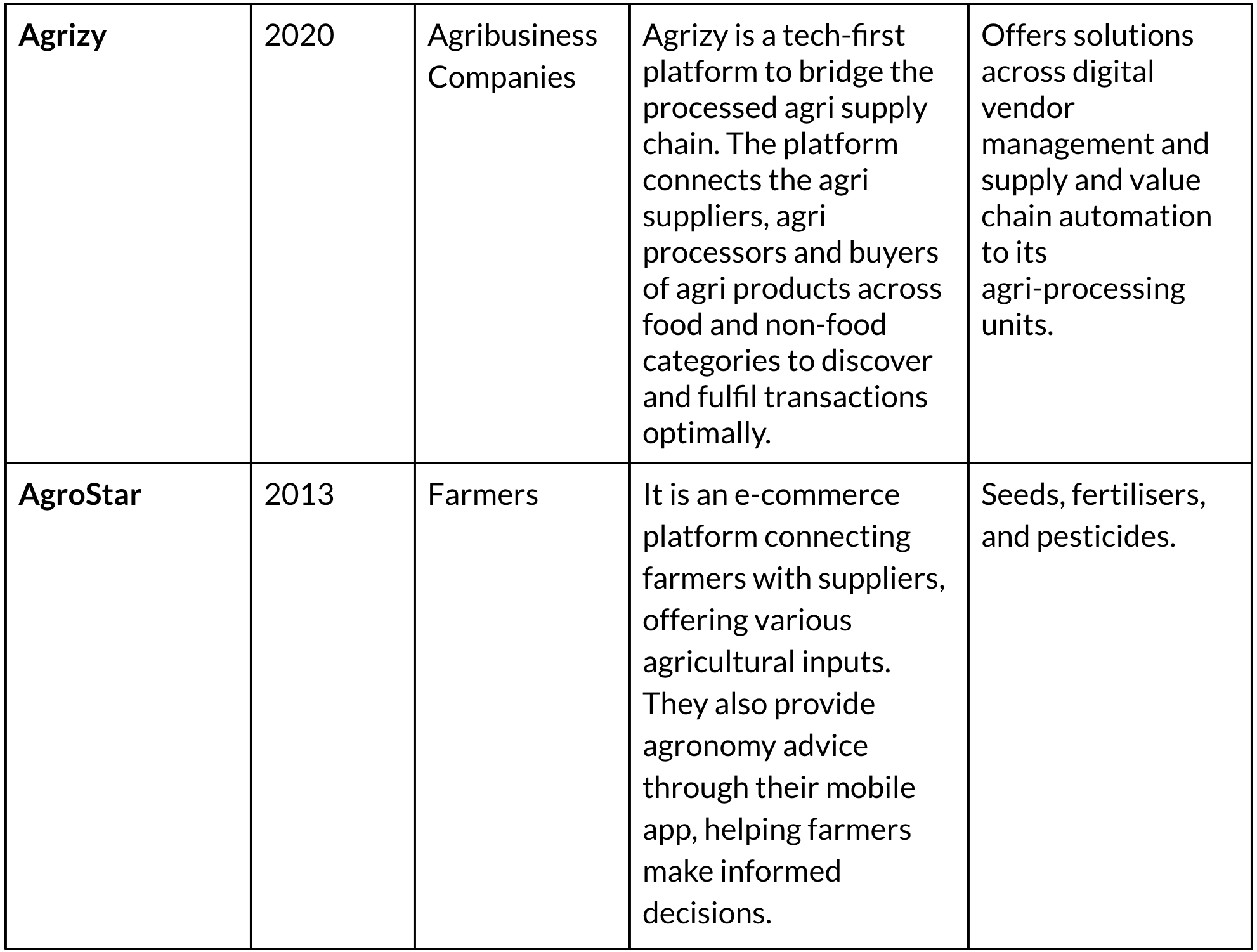
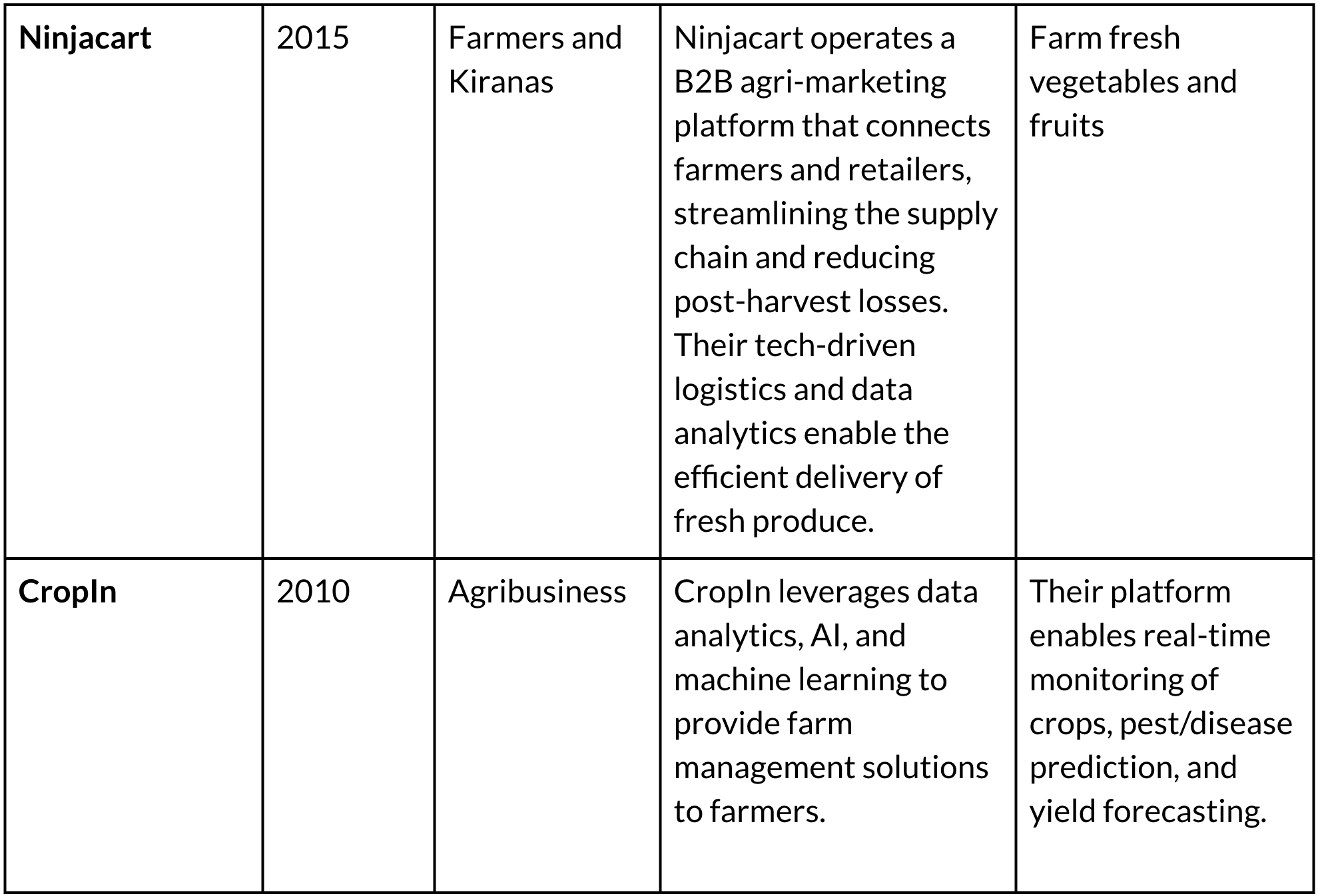

Notable Initiatives by the Indian Government
1. Agricultural accelerator fund and digital public infrastructure: This fund supports the agri-tech industry's growth by funding upcoming start-ups. The government also plans to create a digital infrastructure offering information services to agri-tech companies throughout the entire value chain.
2. Easy digital reach through farmer organisations: The government will invest $750 million to create over 10,000 FPOs in 5 years. This will unite farmers and help agri-tech companies like Samunnati expand.
3. Development of the "agristack": India is creating a database of agricultural data sets that link farmers based on their land holdings. Agri-tech companies can then customise their products to meet farmers' specific needs based on crop types, soil conditions, and land size.
4. Digital soil-health cards: Digital soil-health cards can help agri-tech companies in India with precision farming by mapping soil composition and quality at the individual farmer level.
5. Digitally enabled direct benefit transfer in fertiliser sales: This initiative directly transfers fertiliser subsidies and other goods to the farmer by authenticating the farmer’s identity at points of sale and through verification, maintaining affordability for smallholder farmers.6. National Agriculture Market (eNAM): This pan-India electronic online trading portal connects existing APMC mandis, forming a unified national market for agricultural commodities to ensure better prices for farmers.
Key Insight 3 - Increasing support for agri startups from the central government
The Department of Agriculture & Farmers’ Welfare is implementing the “Innovation and Agri-Entrepreneurship Development” programme to promote innovation and agri-entrepreneurship by providing financial support and nurturing an incubation ecosystem in the country.
Financial support is provided to entrepreneurs in the agriculture & allied sector to set up their startups. For this, financial support of Rs. 5.00 lakh is provided at the idea/pre-seed stage and Rs. 25 lakhs at the seed stage, along with Grants for Indian Startups.
So far, 1138 agri startups are supported under the programme with financial assistance of Rs. 70.30 crores. Technical and financial assistance is provided to startups to launch their products, services, business platforms, etc, into the market and facilitate them to scale up their products and operations to attain business viability.
The agri-tech industry uses technology, data, and partnerships to improve the agriculture industry. These companies aim to improve productivity, optimise resource use, enhance sustainability, and uplift farmers' lives by addressing challenges and offering solutions.
In India, venture capital firms have invested nearly $2.5 billion in agri-tech over the past three years, indicating a significant increase in investor interest.
Agri-tech startups are set to thrive and grow in the years to come!








